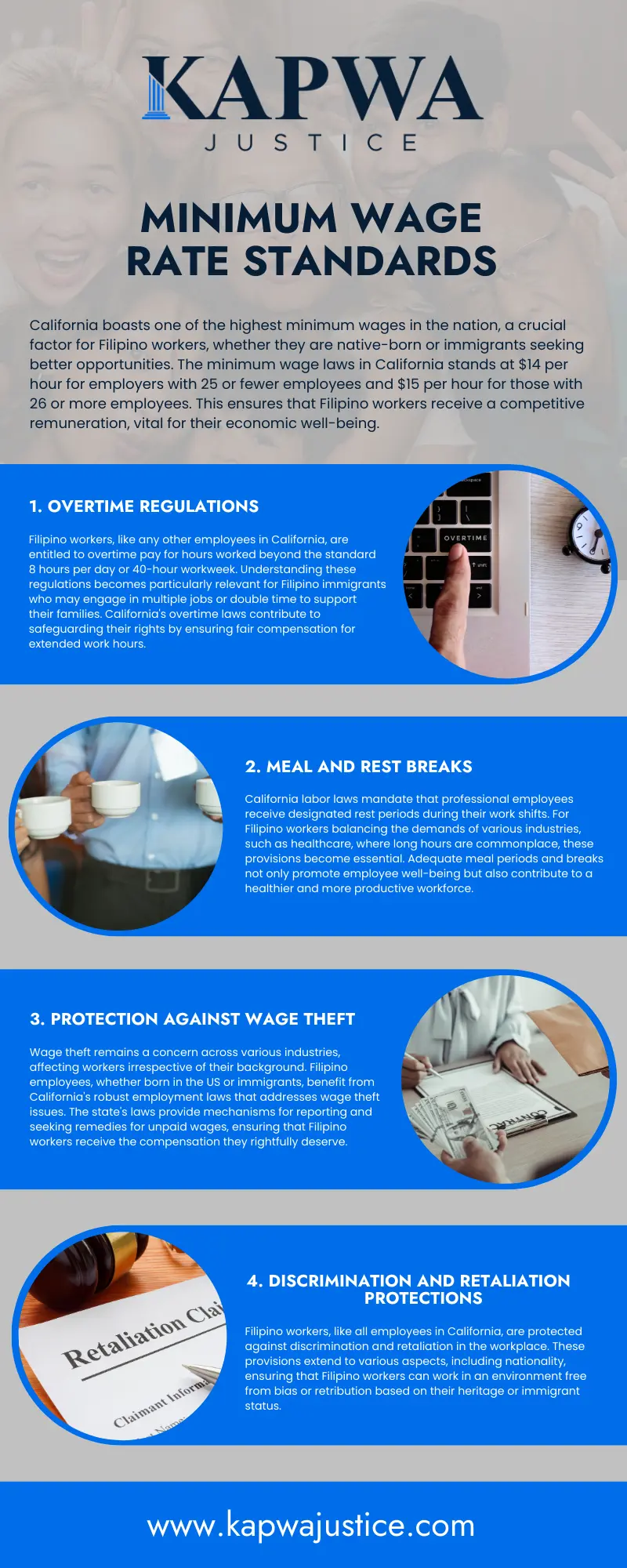
In the dynamic landscape of the labor market, understanding the intricacies of wage and hour laws California is paramount for both employers and employees. For the Filipino community residing in the Golden State, navigating these regulations is not only a legal obligation but a crucial aspect of safeguarding their rights in the workplace. As we delve into the nuanced world of employment legislation, it becomes evident that Filipino workers face unique challenges that demand a comprehensive understanding of California’s labor laws.
In today’s article, we will explore the specific implications of California’s wage and hour laws on Filipino employees, shedding light on key aspects that demand attention, from minimum wage standards to overtime regulations. By gaining a comprehensive understanding of these legal parameters, Filipino workers can empower themselves to navigate the complexities of the state’s labor landscape and ensure their rights are upheld in the pursuit of a dignified and equitable work environment.
California Labor Laws and Filipino Workers
Para saan ang Wage and Hours Law sa California?
California wage and hour laws are designed to protect the rights of workers, setting standards for minimum wage, overtime pay, meal and rest breaks, and other essential employment conditions. However, understanding the specific impact of these laws on Filipino workers, encompassing both those born in the US and immigrants, reveals some unique considerations within the broader context.
Exemptions and Special Considerations
While California’s wage and hour laws provide a comprehensive framework to protect workers’ rights, it’s important to note that certain exemptions and special considerations exist. These limited exceptions may impact how these laws apply to Filipino workers, both born in the US and immigrants. Understanding these nuances is crucial for both eligible employees and employers alike.
Exempt Employees
Certain categories of employees are exempt from certain wage and hour regulations, such as overtime pay. For instance, managerial, professional, and administrative roles may fall under exemptions. Filipino workers in supervisory or executive positions need to be aware of these exemptions, as they may not be entitled to the same overtime benefits as non-exempt employees.
Agricultural Workers
California has specific regulations for agricultural workers, considering the unique nature of their work. This includes different rules for overtime and meal breaks. A major fraction of Filipino workers are employed in the agricultural sector, whether born in the US or immigrants, and should be familiar with these industry-specific exemptions to ensure compliance with the law.
Commissioned Employees
Employees who earn a significant portion of their income through commissions may have different rules governing their wages. This exemption can impact Filipino workers in sales or commission-based roles, altering the standard wage and hour regulations. Awareness of these potential employee misclassifications is vital to ensure proper compensation and adherence to the law.
Independent Contractors
The distinction between employees and independent contractors is critical under California law. Independent contractors are not subject to the same wage and hour regulations as traditional employees. Filipino workers engaged in freelance or independent contracting roles should carefully determine their employment classification to understand their rights and responsibilities.
Special Considerations for Tipped Employees
Certain industries, such as hospitality, often involve tipped employees. California labor laws address the unique circumstances surrounding tips, including rules on tip pooling and distribution. Filipino workers in the service industry should be aware of these specific considerations to ensure fair compensation for their work.
Common Challenges for Filipino Workers
Filipino workers, particularly those engaged in low-wage industries, often grapple with issues concerning underpayment and unpaid overtime. Employers in these sectors may neglect minimum wage standards or fail to adequately compensate employees for the extra hours worked beyond the standard workweek.
Another common challenge faced by Filipino workers is the misclassification of their employment status, with some being erroneously labeled as exempt or independent contractors. This misclassification can result in violations of wage and hour laws, depriving workers of entitled benefits, including overtime pay and meal breaks.
Unlawful deductions from Filipino workers’ wages, such as those for uniforms or equipment, present another significant challenge. Employers making unauthorized deductions run afoul of wage and hour laws, leading to workers not receiving their full entitled compensation.
In industries with demanding schedules, such as healthcare or hospitality, Filipino workers may confront difficulties in securing legally mandated meal and rest breaks. The failure to provide adequate breaks becomes a prevalent challenge, impacting the well-being of employees.
Delayed or irregular paychecks pose financial stability challenges for some Filipino workers. Timely and consistent payment, a fundamental right protected by wage and hour laws, becomes compromised, affecting workers’ ability to meet financial obligations.
Moreover, the fear of retaliation can deter Filipino workers from reporting labor law violations. Concerns about job security or other adverse consequences act as barriers, hindering the effective enforcement of their rights.
Kapwa Justice is Here to Fight for your Rights
At Kapwa Justice, our team of dedicated lawyers stands ready to champion the rights of the Filipino community in California. We understand the unique challenges faced by Filipino workers concerning wage and hour laws and are committed to providing expert legal guidance and representation. If you or someone you know has experienced any form of workplace injustice, we invite you to take the first step toward justice. Call us today for a free consultation! Together, we can navigate the complexities of the law and ensure that the rights of the Filipino community are not only protected but vigorously upheld. Your voice matters, and at Kapwa Justice, we are here to amplify it. ‘Di ka nag-iisa.






